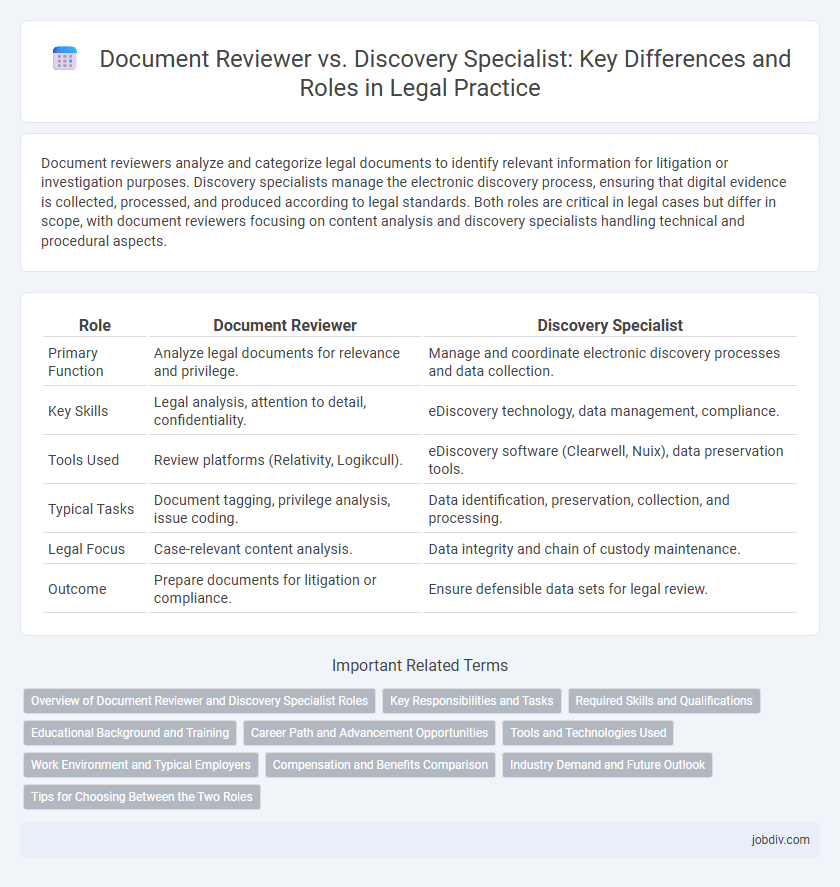Document reviewers analyze and categorize legal documents to identify relevant information for litigation or investigation purposes. Discovery specialists manage the electronic discovery process, ensuring that digital evidence is collected, processed, and produced according to legal standards. Both roles are critical in legal cases but differ in scope, with document reviewers focusing on content analysis and discovery specialists handling technical and procedural aspects.
Table of Comparison
| Role | Document Reviewer | Discovery Specialist |
|---|---|---|
| Primary Function | Analyze legal documents for relevance and privilege. | Manage and coordinate electronic discovery processes and data collection. |
| Key Skills | Legal analysis, attention to detail, confidentiality. | eDiscovery technology, data management, compliance. |
| Tools Used | Review platforms (Relativity, Logikcull). | eDiscovery software (Clearwell, Nuix), data preservation tools. |
| Typical Tasks | Document tagging, privilege analysis, issue coding. | Data identification, preservation, collection, and processing. |
| Legal Focus | Case-relevant content analysis. | Data integrity and chain of custody maintenance. |
| Outcome | Prepare documents for litigation or compliance. | Ensure defensible data sets for legal review. |
Overview of Document Reviewer and Discovery Specialist Roles
Document reviewers analyze and categorize large volumes of electronic and paper documents to identify relevant information for legal cases, ensuring accuracy and compliance with case requirements. Discovery specialists manage the electronic discovery (e-discovery) process, including data collection, processing, and preservation, to support litigation and regulatory investigations. Both roles are essential in legal workflows, with document reviewers focusing on content examination and discovery specialists overseeing technical data handling and management.
Key Responsibilities and Tasks
Document Reviewers meticulously analyze and categorize large volumes of legal documents to identify relevant information and ensure compliance with case requirements. Discovery Specialists manage the entire eDiscovery process, including data collection, preservation, and processing, to support litigation and regulatory investigations. Their expertise in handling electronically stored information (ESI) and coordinating with legal teams is critical for effective case strategy and risk mitigation.
Required Skills and Qualifications
Document Reviewers must possess strong analytical skills, attention to detail, and proficiency in legal research and document management software such as Relativity or Concordance. Discovery Specialists require expertise in electronic discovery (e-discovery), data collection protocols, and familiarity with litigation support tools, along with knowledge of relevant legal regulations like the Federal Rules of Civil Procedure. Both roles demand excellent communication skills, ability to work under tight deadlines, and understanding of legal terminology and case law.
Educational Background and Training
Document Reviewers typically possess a bachelor's degree in law, paralegal studies, or related fields, with specialized training in legal terminology and e-discovery software. Discovery Specialists often hold advanced certifications in e-discovery, data analytics, or information governance, complemented by hands-on experience with litigation support technologies. Both roles require continuous education to stay current with evolving legal standards and technological advancements in electronic discovery processes.
Career Path and Advancement Opportunities
Document reviewers primarily focus on analyzing and categorizing legal documents during the e-discovery process, often serving as entry-level roles that lead to advancement as discovery specialists. Discovery specialists possess deeper expertise in managing complex litigation materials, utilizing advanced software tools and coordinating e-discovery workflows, positioning them for senior roles such as e-discovery managers or legal project managers. Career advancement opportunities increase significantly by gaining specialized certifications like Certified E-Discovery Specialist (CEDS) and developing technical skills in legal technology platforms.
Tools and Technologies Used
Document reviewers primarily utilize advanced e-discovery platforms such as Relativity, Clearwell, and Concordance to analyze and categorize legal documents efficiently. Discovery specialists often employ sophisticated data processing tools, including forensic software like EnCase and FTK, alongside predictive coding and AI-driven analytics to identify relevant evidence across large datasets. Both roles rely heavily on technology that supports effective data management, search functionalities, and compliance with legal standards during litigation.
Work Environment and Typical Employers
Document Reviewers typically operate within law firms, corporate legal departments, or e-discovery service providers, working in office settings or remotely with digital document management systems. Discovery Specialists commonly work for litigation support firms, legal consultancies, or large corporations' legal teams, often handling complex data environments requiring advanced technology and collaboration with IT professionals. Both roles demand proficiency in legal software and adherence to strict confidentiality protocols in dynamic, deadline-driven environments.
Compensation and Benefits Comparison
Document Reviewers typically earn between $25 and $50 per hour, depending on experience and firm size, with benefits often limited to contract-based roles including minimal or no health insurance and retirement plans. Discovery Specialists command higher salaries, averaging $70,000 to $120,000 annually, with comprehensive benefits packages encompassing health insurance, paid leave, and retirement contributions due to their specialized expertise in managing electronic discovery processes. Compensation disparities reflect the complexity and responsibility levels, where Discovery Specialists' advanced skills in data management and legal technology justify increased remuneration and enhanced benefits.
Industry Demand and Future Outlook
Document reviewers and discovery specialists both play critical roles in legal e-discovery, with discovery specialists increasingly in demand due to the growth of complex data volumes and advanced technology tools. Industry projections indicate a rising need for discovery specialists skilled in AI-driven analytics, predictive coding, and data privacy compliance to handle large-scale investigations efficiently. The future outlook favors discovery specialists as firms invest in specialized expertise to navigate evolving regulatory landscapes and reduce litigation risks.
Tips for Choosing Between the Two Roles
Choosing between a Document Reviewer and a Discovery Specialist depends on the complexity of the legal case and the volume of documents involved. Document Reviewers excel in identifying key information and ensuring accuracy under tight deadlines, while Discovery Specialists bring expertise in managing electronic discovery tools and data analysis. Evaluate the legal team's needs in terms of technical skill, case scope, and budget to select the most effective role for your litigation strategy.
Document Reviewer vs Discovery Specialist Infographic

 jobdiv.com
jobdiv.com